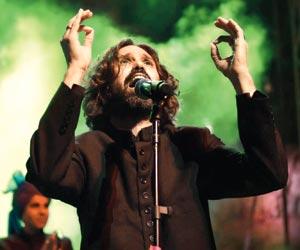Israeli musician Shye Ben Tsur gives the traditional Sufi qawwali a Hebrew twist

Shye Ben Tsur
"My sasural is there," says Shye Ben Tsur of Ajmer, almost shyly, of where he lives when in India. Ajmer, says the 42-year-old Israeli musician, changed the course of his life when he arrived there almost two decades ago. Next Sunday, Shye will perform at the National Centre of Performing Arts (NCPA) as part of its three-day Sufi festival. Shye first came to India when he was about 19 years to study Indian classical music.
ADVERTISEMENT

Shye Ben Tsur
"At the time, I was discovering the different aspects of north Indian classical music," he says over a phone call from Tel Aviv. "Outside of India, the Indian music is considered one entity. There's less emphasis on the different traditions within Indian music. When I learnt more, I learnt about the dhrupad, khayal and the different gharanas. It was also in India that I discovered qawwali and that it was another form of Indian music."
When Shye went to Ajmer, this was somewhere between 1997 and 1998, he "experienced" the form. Here in Ajmer, he says, "My life took some twists and turns and focus changed and it [qawwali] became the centre of my life and inspired me very much." Qawwalis, he says, which talk of sufi devotion, which was very much a part of Hebrew tradition. "The words used were in Urdu, which shares many words with Arabic, which is not very different from what Hebrew does, too."
The study of Indian music took Shye to Bhopal where once, while reading a book at a Dhrupad Kendra, he read a line that said, "a man does not speak the language even if he learns a 100 songs in it." The line resonated with him. "I was studying all these songs and they were in a musical language that had conquered my heart but the poetic language was something I had to translate in order to identify myself with what I was singing." It was then that he decided to start composing qawwalis in Hebrew.
Shye who spent much of his adult life in India, now divides his time between India and Israel, when not heading to various countries across the globe for performances. He has even performed at Ajmer's famed Dargah Sharif. "I was very lucky that the Hasrat Inam Hassan and Inam Hasan Gudri Shah Baba invited me many times to sing and play my music at the dargah of Khwaja Moinuddin Chisti." In fact, the rehearsals for his last album Junoon were conducted at the Ajmer Sharif.
Traditionally, he says, a qawwali performance is held in the traditional milieu, at a dargah for instance, in the presence of a sufi spiritual guide. The Sama, which means listening, is usually conducted on auspicious days, at some time in the night. At the NCPA performance, he says he and his band will perform original compositions in Hebrew, Urdu and Hindi, with the difference also coming in from the departure of the instruments used. The guitar, for instance, will be a modern addition.
When: November 12, 7 pm
Where: Tata Theatre, NCPA, Nariman Point
Entry: Rs 700-Rs 1,000
Call: 66223737
 Subscribe today by clicking the link and stay updated with the latest news!" Click here!
Subscribe today by clicking the link and stay updated with the latest news!" Click here!






